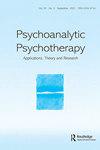Psychoanalytic practice today: a post-bionian introduction to psychopathology, affect and emotions
IF 1.2
Q1 PSYCHOLOGY, PSYCHOANALYSIS
引用次数: 0
Abstract
whilst the horizontal axis shows how sense can be made of the beta unprocessed elements, with any consequent failure to do so resulting in disturbing sensory data being experienced by the patient in crisis. The concept of ‘O’, as outlined by Bion, is constantly returned to throughout this book, in particular through dream material. For Bion ‘O’ represented the aim of psychoanalysis and was about seeking the truth, rather than trying to make a patient better. The concept of ‘O’ continues to be debated and valued by many, as well as being open to further interpretation and understanding. For some British analysts, however, it can be seen as overly esoteric, and at times confusing in its many different renderings. As I understand it, the intention, according to Bion, is to be aiming for “transformations in ‘O’ within the analyst”; this involves the ‘indivisibility of the transference-counter transference in the analyst’s reverie’, that is the analyst has to feel the actual agony and anguish expressed by the patient. Part II of the book offers chapters on clinical presentations and thinking on issues of abandonment, exclusion, rage and shame, jealousy, betrayals, surprise, contempt, and sadness. Attention is paid in great detail, theoretically and with live cases, to all these issues, which one could say inevitably dominate any therapeutic practice. Chapter 12 ‘Betrayals. Psychoanalytic Pathways in the works of James Joyce’ by Fulvio Mazzacane, however, focusses entirely on Joyce’s literary work, which he maintains is concerned with the theme of betrayal in the most important relationships, whether personal or in terms of country of origin. This is a rich addition to this collection, and though not without description of pain and distress, it does bring some light relief as fiction often can to the reader. In conclusion, what is striking throughout this book is the openness and honest self-awareness that each analyst brings to their therapeutic engagement, on occasions referencing what they acknowledge as their own shortcomings. Nicoli Luca, in Chapter 14, ‘Contempt’, notes that on one occasion he effectively forgot to arrive in time at his consulting room to meet with a new oncea-week patient. He acknowledges his own unwitting disregard of the patient, that is his contempt, as this was not a ‘proper’, high frequency analysis. Antonino Ferro is an original thinker who believes psychoanalysis must always be open to new developments and theories, but at the same time pays 280 Book Review今天的精神分析实践:精神病理学、情感和情绪的后仿生学导论
而横轴显示了β未经处理的元素是如何产生感觉的,任何由此产生的失败都会导致处于危机中的患者体验到令人不安的感觉数据。正如比昂所概述的,“O”的概念在整本书中不断回归,尤其是通过梦境材料。因为“O”代表了精神分析的目的,是为了寻求真相,而不是试图让病人变得更好。“O”的概念继续受到许多人的争论和重视,并对进一步的解释和理解持开放态度。然而,对于一些英国分析人士来说,它可能被视为过于深奥,有时在许多不同的渲染中令人困惑。据我所知,根据Bion的说法,其目的是“分析师内部‘O’的转变”;这涉及到分析者幻想中移情反移情的不可分割性,即分析者必须感受到患者所表达的实际痛苦和痛苦。本书第二部分提供了关于遗弃、排斥、愤怒和羞耻、嫉妒、背叛、惊讶、蔑视和悲伤等问题的临床表现和思考章节。理论上和实际病例都非常详细地关注所有这些问题,可以说这些问题不可避免地主导了任何治疗实践。第12章背叛。然而,Fulvio Mazzacane的James Joyce作品中的精神分析路径完全集中在Joyce的文学作品上,他认为这部作品关注的是最重要关系中的背叛主题,无论是个人关系还是原籍国关系。这是本集的一个丰富补充,尽管并非没有对痛苦和痛苦的描述,但它确实给读者带来了一些轻松的解脱,就像小说经常给读者带来的那样。总之,整本书引人注目的是,每个分析师在他们的治疗参与中都表现出了开放和诚实的自我意识,有时会提到他们承认的自己的缺点。Nicoli Luca在第14章“蔑视”中指出,有一次他实际上忘记了及时到达诊室去见一位每周一次的新病人。他承认自己无意中忽视了病人,这就是他的蔑视,因为这不是一个“适当的”高频分析。安东尼诺·费罗是一位独创的思想家,他相信精神分析必须始终对新的发展和理论持开放态度,但同时也支付了280英镑的书评费
本文章由计算机程序翻译,如有差异,请以英文原文为准。
求助全文
约1分钟内获得全文
求助全文
来源期刊

Psychoanalytic Psychotherapy
PSYCHOLOGY, PSYCHOANALYSIS-
CiteScore
1.30
自引率
37.50%
发文量
22
期刊介绍:
Psychoanalytic Psychotherapy publishes original contributions on the application, development and evaluation of psychoanalytic ideas and therapeutic interventions in the public health sector and other related applied settings. The Journal aims to promote theoretical and applied developments that are underpinned by a psychoanalytic understanding of the mind. Its aims are consonant with those of the Association for Psychoanalytic Psychotherapy in the NHS (APP in the NHS) in promoting applied psychoanalytic work and thinking in the health care system, across the whole age range.
 求助内容:
求助内容: 应助结果提醒方式:
应助结果提醒方式:


